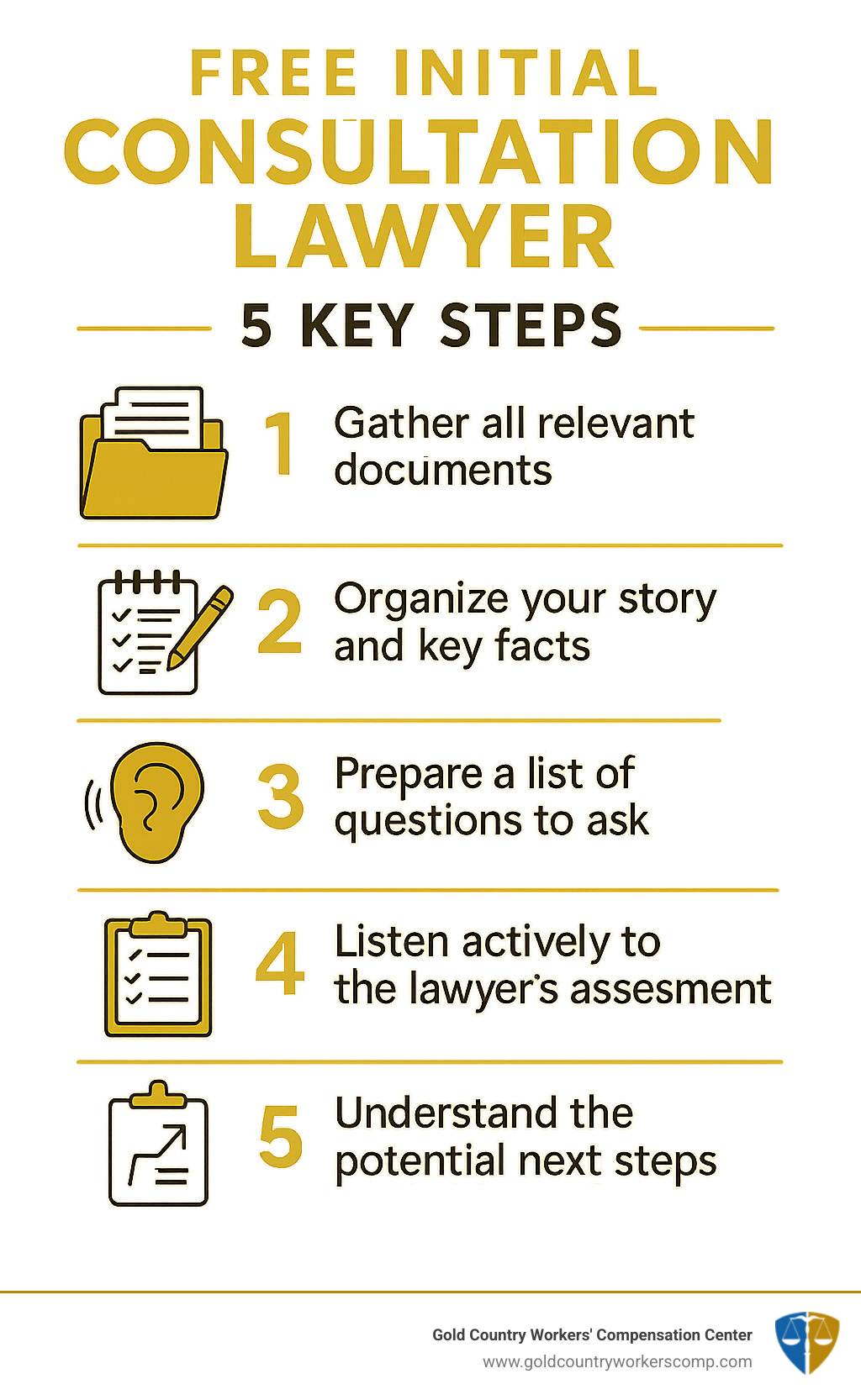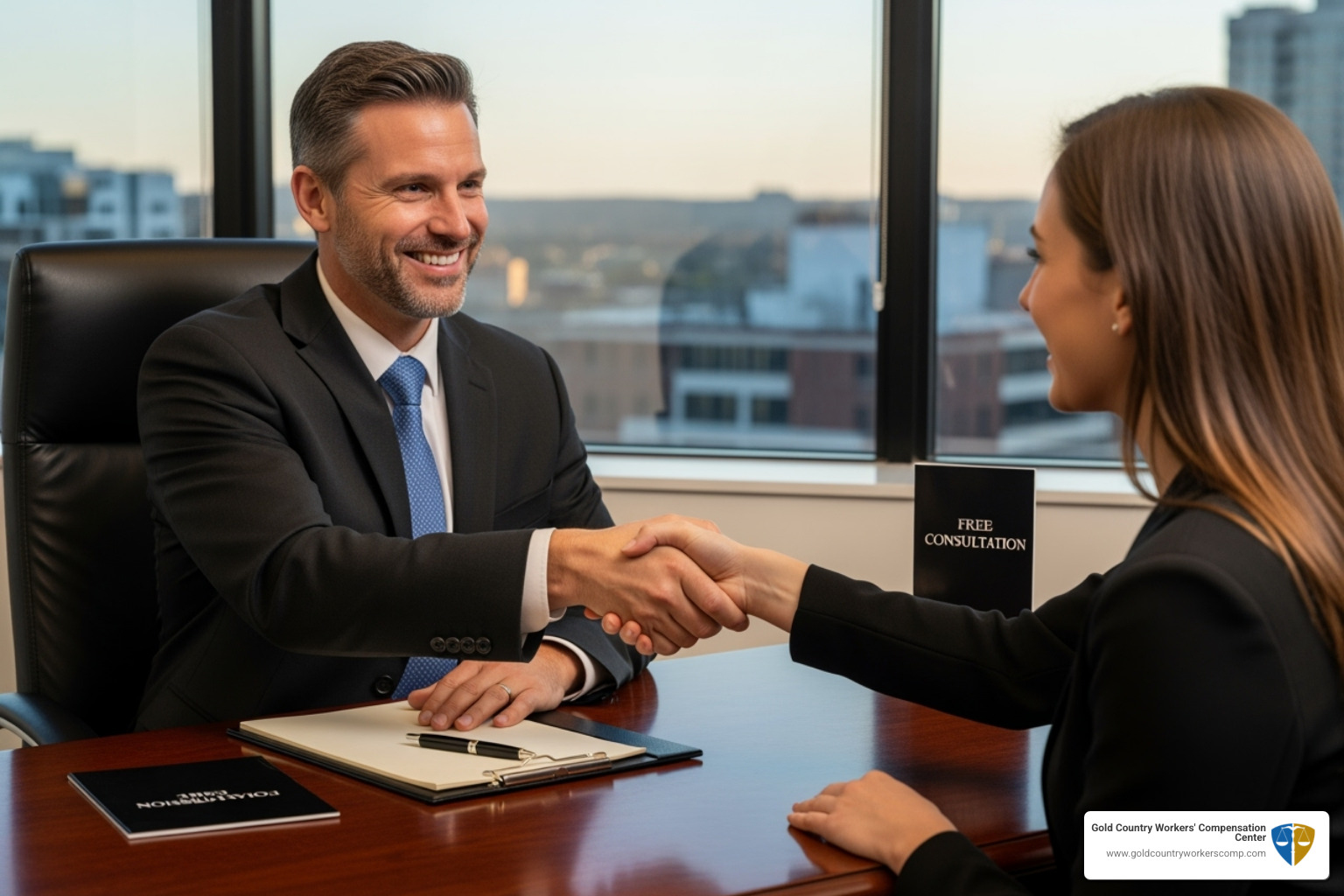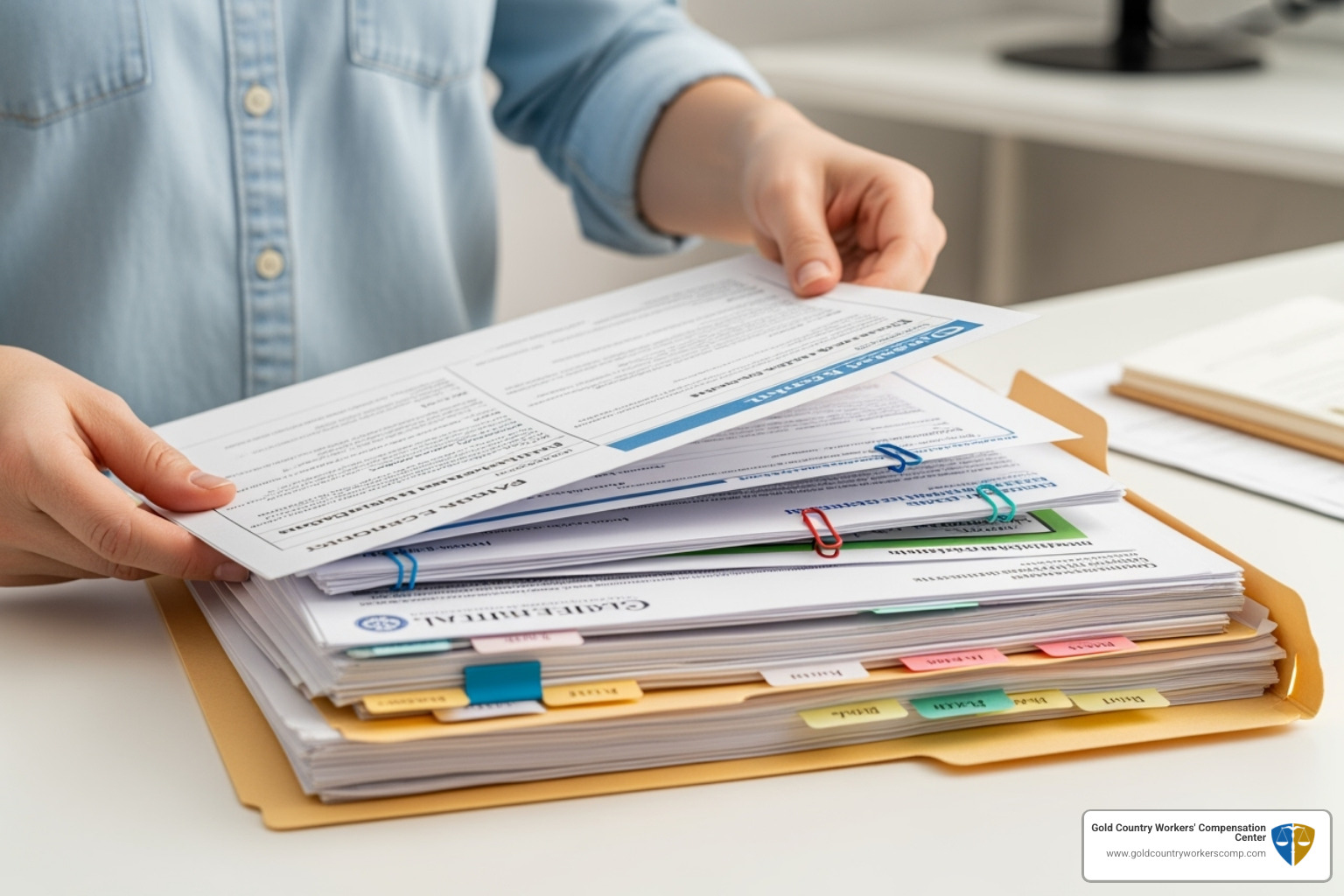Understanding the “Free Initial Consultation Lawyer” Offer
Facing a legal issue can feel overwhelming, especially when you’re an injured worker concerned about your livelihood. Many people hesitate to seek legal help because they worry about the cost. This is where a free initial consultation lawyer comes in. It’s a risk-free first step to explore your legal options, understand your situation better, and decide if a lawyer is the right fit for you.
What Exactly is a Free Consultation?
A free legal consultation is an initial meeting with an attorney that happens before you decide to hire them. Think of it as a mutual interview. You get to discuss your legal issue, and the lawyer determines if they can represent you. These meetings are genuinely free, with no hidden fees, and typically last between 15 and 60 minutes. The goal is to provide enough information for you to understand your legal recourse and decide on your next steps, with no obligation to hire the firm.

The Key Benefits of a No-Cost First Meeting
A free consultation offers significant advantages for a potential client.

- No Financial Commitment: Get preliminary legal insights without any cost or risk.
- Clarify Your Legal Standing: Determine if you have a case and understand your rights and options.
- Gauge the Lawyer’s Expertise: Interview the lawyer and assess their experience with similar cases.
- Evaluate Communication Style: See if the lawyer explains complex topics clearly and understandably.
- Assess Personality Fit: Determine if you feel comfortable working with the lawyer, as legal matters can be long and stressful.
- Understand Processes and Costs: Get an outline of the likely legal process, timelines, and potential costs if you proceed.
Limitations: What a Free Consultation Is NOT
It’s crucial to understand what a free consultation is not designed for:
- Not for Specific Legal Advice: The meeting is for assessment, not to provide a definitive legal answer that solves your problem. The lawyer won’t tell you exactly how to win your case.
- Not for Performing Legal Work: The lawyer will not draft letters, fill out forms, or negotiate on your behalf during this free period.
- Not a Deep Dive into Every Detail: The time-limited meeting is for a preliminary assessment, not an exhaustive analysis of every detail.
- Not a Substitute for Hiring a Lawyer: The consultation is the first step toward forming an attorney-client relationship, not the relationship itself. A formal agreement is required for official representation.
The purpose is to give you enough information to make an informed decision, not to resolve your entire legal issue in one free session.
How to Prepare for Your Free Legal Consultation
Getting ready for your meeting with a free initial consultation lawyer is the best way to ensure it’s productive. Since you may only have 30 to 60 minutes, being organized helps you get the most value from the conversation.
Gather Your Documents and Evidence
Your lawyer needs to see the facts. When attorneys like Kim LaValley or Kyle Adamson meet a new client, having the right paperwork allows them to assess a case’s strength quickly.

Bring the following if they apply to your situation:
- Personal Identification: Driver’s license, health insurance card, Social Security number.
- Employment Records: Pay stubs, employment contract, and any correspondence with your employer about your injury, termination, or severance.
- Medical Documentation: All medical records, doctor’s notes, prescriptions, and bills related to your injury, including relevant past medical history.
- Incident or Police Reports: Official reports about the accident.
- Photos and Videos: Pictures of your injuries, the accident scene, or property damage.
- Correspondence: Letters or emails from insurance companies (especially denial letters), your employer, or other involved parties.
- Financial Records: Pay stubs or tax returns to show lost wages and estimates for repairs.
- Witness Information: Names and contact information for anyone who saw the incident.
Organize Your Story and Key Facts
Being able to tell your story clearly is just as important as having documents. Your lawyer needs to understand what happened and how it has affected your life.
- Create a timeline: Write down a chronological list of key dates, such as the date of injury, doctor visits, and when you reported the incident.
- Prepare a brief summary: Practice explaining your core problem in a few sentences. For example: “I was injured at work on June 5, 2023. My employer’s insurance denied my claim, and now I can’t work or get medical treatment.”
- Identify everyone involved: List the names and contact information for supervisors, HR staff, doctors, insurance adjusters, and witnesses.
- Write down your questions: Prepare a list of your most important questions to ensure you don’t forget anything.
- Be completely honest: Your lawyer can only help if they know all the facts, including any that might seem unfavorable. Disclosing previous injuries or potential fault upfront is always better than having them find out later.
This preparation ensures you receive the best possible advice and feel more confident about your next steps.
Maximizing the Meeting: What to Expect and What to Ask
Knowing what happens during the consultation and what questions to ask will empower you to make an informed decision. This is your chance to take control of the process.
The Consultation Process: A Step-by-Step Walkthrough
While each firm is different, most free consultations with a free initial consultation lawyer follow a general flow:
- Introductions: You’ll meet the lawyer and possibly other legal staff who may work on your case.
- Presenting Your Case: Using your prepared timeline and summary, you’ll explain your legal problem. The lawyer will listen for key facts to assess the strength of your case.
- Lawyer’s Questions: The attorney will ask for more details to clarify facts and understand the situation fully. Be open and honest in your answers.
- Your Questions: This is your opportunity to ask the questions you prepared to determine if the lawyer is the right fit for you.
- Discussing Next Steps: The lawyer will provide their initial thoughts on your legal options, explain their fee structure (such as a contingency fee for workers’ comp cases), and outline potential timelines.
Everything you discuss is protected by attorney-client confidentiality, even if you don’t hire the lawyer. You can speak freely from your very first conversation.
Essential Questions to Ask Your Potential Lawyer
This is your chance to interview the lawyer. Don’t be shy about asking direct questions to assess their suitability.
- “What is your experience with cases like mine?” You need a lawyer who understands your specific issue, like workers’ compensation or disability.
- “What is your general strategy for a case like this?” They won’t have a full plan, but they should be able to outline a potential approach.
- “How are your fees structured?” Many workers’ comp lawyers, like our team at Gold Country Workers’ Compensation Center, work on a contingency fee basis, meaning you don’t pay unless they win or settle your case. Ask about other potential costs, like filing fees.
- “Who will be my main point of contact?” Find out if you’ll be working primarily with the lawyer you’re meeting or another team member.
- “How will we communicate about my case?” Ask about the frequency of updates and the best way to reach the team.
- “What is the estimated timeline?” While not exact, the lawyer should be able to provide a general timeframe.
- “What are the potential challenges or weaknesses in my case?” A good lawyer will be honest about potential obstacles.
The Lawyer’s Perspective: How They Evaluate Your Case
While you evaluate the lawyer, they are also evaluating your case. Understanding their criteria can help you present your situation effectively.
A free initial consultation lawyer typically assesses:
- Legal Merit: Does your case have a strong legal basis? For a workers’ comp claim, they’ll verify the injury is work-related.
- Viability and Damages: Is the case practical to pursue? A lawyer must determine if the potential outcome justifies the legal effort.
- Expertise Match: Does the case fall within their specialty? A firm like Gold Country Workers’ Compensation Center focuses on specific practice areas and won’t take cases outside that scope.
- Client Credibility: How you present your story matters. Being direct, honest, and believable is important.
- Conflicts of Interest: The lawyer must perform an ethical check to ensure they have no conflicts with other clients.
- Profitability: For firms working on contingency, they must assess if a successful outcome is likely enough to cover their time and resources.
If a lawyer declines your case, it is usually for one of these reasons and is not a personal judgment.
Finding the Right Lawyer and Taking the Next Steps
After one or more consultations, you’ll need to evaluate your options and decide how to proceed.
How to Find a Reputable Free Initial Consultation Lawyer
Finding the right free initial consultation lawyer is a critical first step. Here are some effective methods:
- Online Search: Use terms like “workers’ compensation lawyer free consultation California” to find local firms. Look for websites that clearly state their consultation policy, as we do.
- Bar Association Referrals: Many state bar organizations, like The State Bar of California’s Lawyer Referral Services, connect you with lawyers who provide free or low-cost consultations.
- Personal Recommendations: Ask trusted friends, family, or colleagues for referrals.
- Law Firm Websites: Review websites for attorney bios, client testimonials, and specializations. Look for firms that focus on your area of need, like the team at Gold Country Workers’ Compensation Center, which has nearly 50 years of combined experience helping clients in Grass Valley, Roseville, Nevada City, and the greater Sacramento area.
- Legal Aid and Law School Clinics: These organizations can be excellent resources for free or low-cost legal support if you have a limited income.
After the Consultation: Deciding to Hire the Lawyer
Once your consultation is over, take time to make an informed decision.
- Review Your Notes: Did the lawyer answer your questions clearly and thoroughly?
- Assess Your Comfort Level: Did you feel respected and heard? A good personal fit is important for a long-term working relationship.
- Understand the Retainer Agreement: If you decide to proceed, the lawyer will provide a retainer agreement. This contract outlines the scope of work, fees, and responsibilities. Read it carefully and ask questions before signing.
- Forming the Attorney-Client Relationship: Signing the retainer agreement officially establishes the attorney-client relationship, meaning the lawyer now formally represents you.
If you don’t feel comfortable, you are under no obligation to hire the lawyer and are free to seek other options.
What Happens if the Lawyer Declines Your Case?
It can be disappointing if a lawyer declines your case, but it’s rarely a personal judgment. It is usually a strategic decision based on factors like:
- Lack of Legal Merit: The case may not have a strong enough legal basis.
- Outside Their Expertise: The issue may fall outside the lawyer’s primary practice area.
- Not Economically Viable: For contingency-based firms, the potential damages may not justify the cost of litigation.
- Conflicts of Interest: The lawyer may have a conflict with another client.
If your case is declined, don’t be discouraged. Ask if they can refer you to another attorney and continue seeking consultations until you find the right fit.
Frequently Asked Questions about Free Lawyer Consultations
Here are answers to some common questions about meeting with a free initial consultation lawyer.
How long does a free initial consultation with a lawyer typically last?
The length varies by firm and case complexity, but most consultations last between 15 and 60 minutes. Some referral services offer quick 15-minute calls, while a dedicated firm may offer more time. At Gold Country Workers’ Compensation Center, we typically provide a 30-minute discussion to get a good handle on your case details and determine if we are a good fit to help you. The goal is to give you enough time to walk away with a clear sense of direction.
Is everything I say during a free consultation confidential?
Yes, absolutely. The principle of attorney-client privilege extends to prospective clients. This means that everything you discuss is private and protected, even if you decide not to hire the lawyer. They are legally and ethically prohibited from sharing your information. This confidentiality is a cornerstone of the legal profession, allowing you to speak openly about your concerns from the very first conversation.
Will I get specific legal advice to solve my problem in a free consultation?
Generally, no. A free consultation is an information-gathering and assessment session, not a problem-solving session. The lawyer’s main purpose is to provide legal information, evaluate the viability of your case, and outline potential strategies. They will help you understand your rights and available options.
They will not perform legal work like drafting documents or negotiating on your behalf. The goal is to empower you with enough knowledge to make an informed decision about hiring a lawyer, not to resolve your entire issue on the spot.
Conclusion
When facing a legal challenge that affects your health and job, the cost of legal help can be a major worry. A free initial consultation lawyer removes that barrier, offering a clear, risk-free path to understanding your options.
This consultation is your opportunity to take control. By preparing your documents, organizing your story, and asking thoughtful questions, you can turn this meeting into a powerful first step. You will walk away with a better understanding of your rights and options, which is invaluable knowledge.
At Gold Country Workers’ Compensation Center, we know that early intervention makes a significant difference. With nearly 50 years of combined experience helping injured workers across California, we believe understanding your rights shouldn’t cost you anything upfront. We offer comprehensive, no-cost case evaluations because every worker deserves to know where they stand, especially when dealing with the stress of an injury.
Don’t let a legal challenge overwhelm you. Take the first step, ask the important questions, and find an advocate who will fight for the positive outcome you deserve.
Contact our California workers’ comp attorneys for a free consultation









